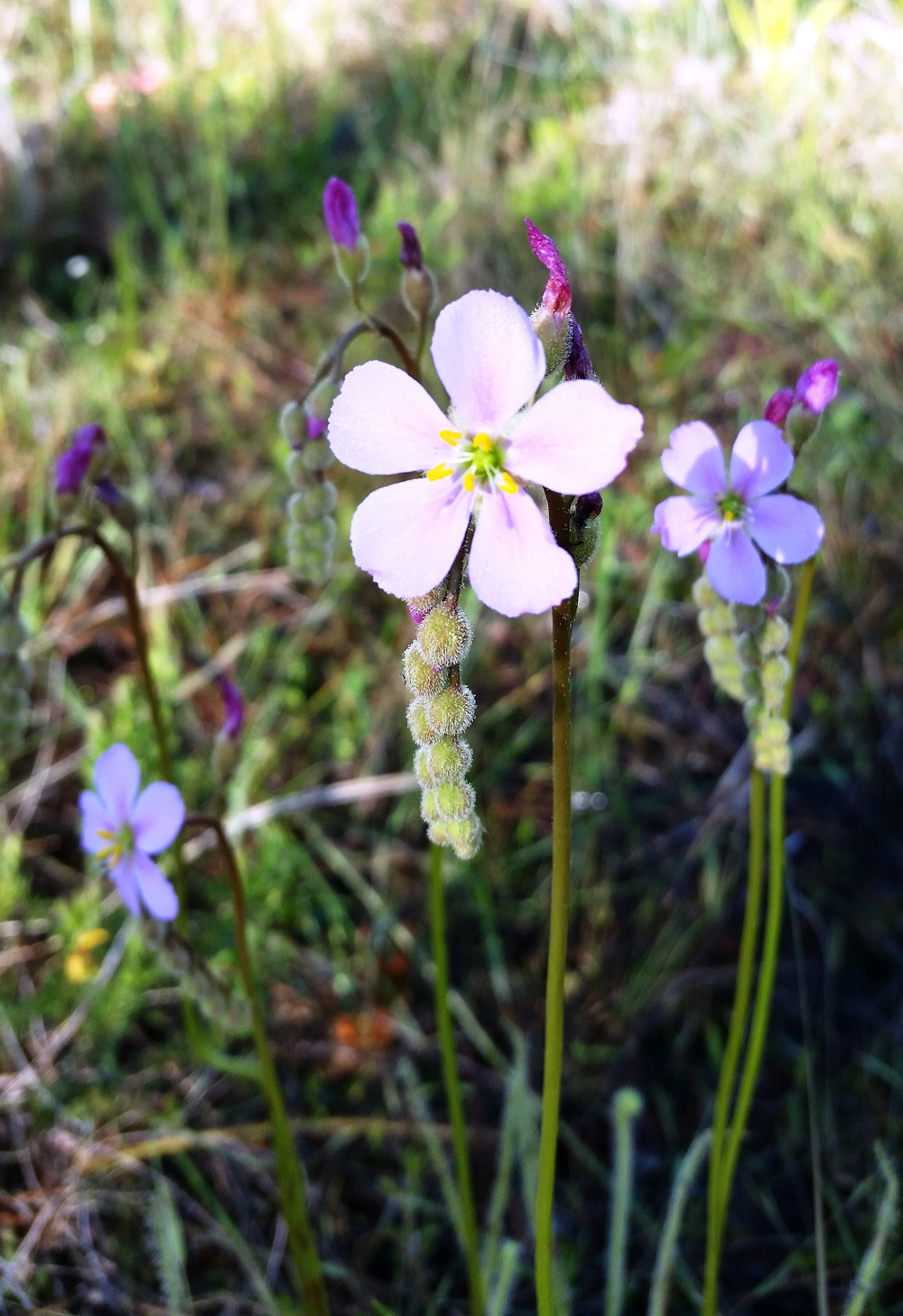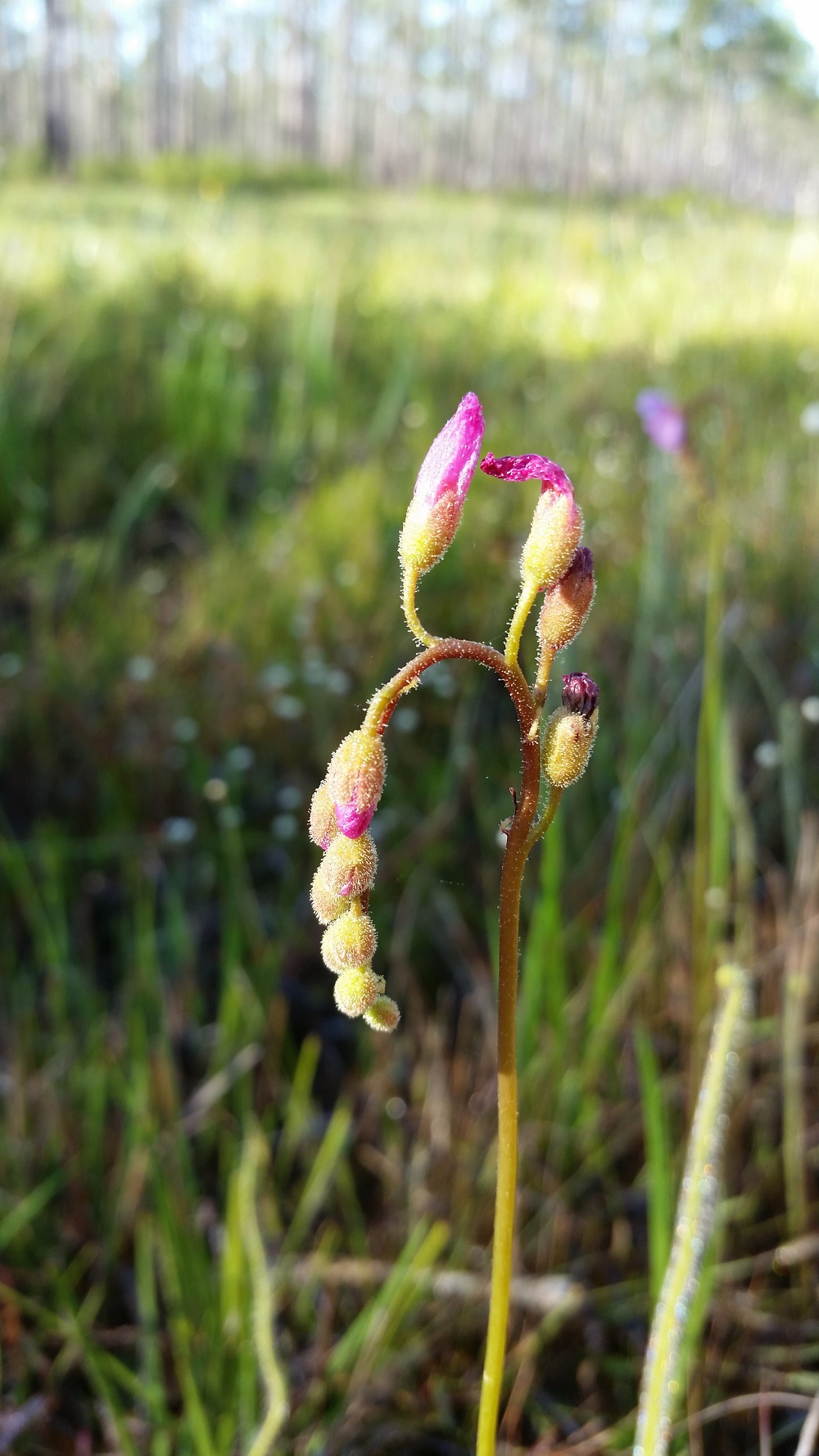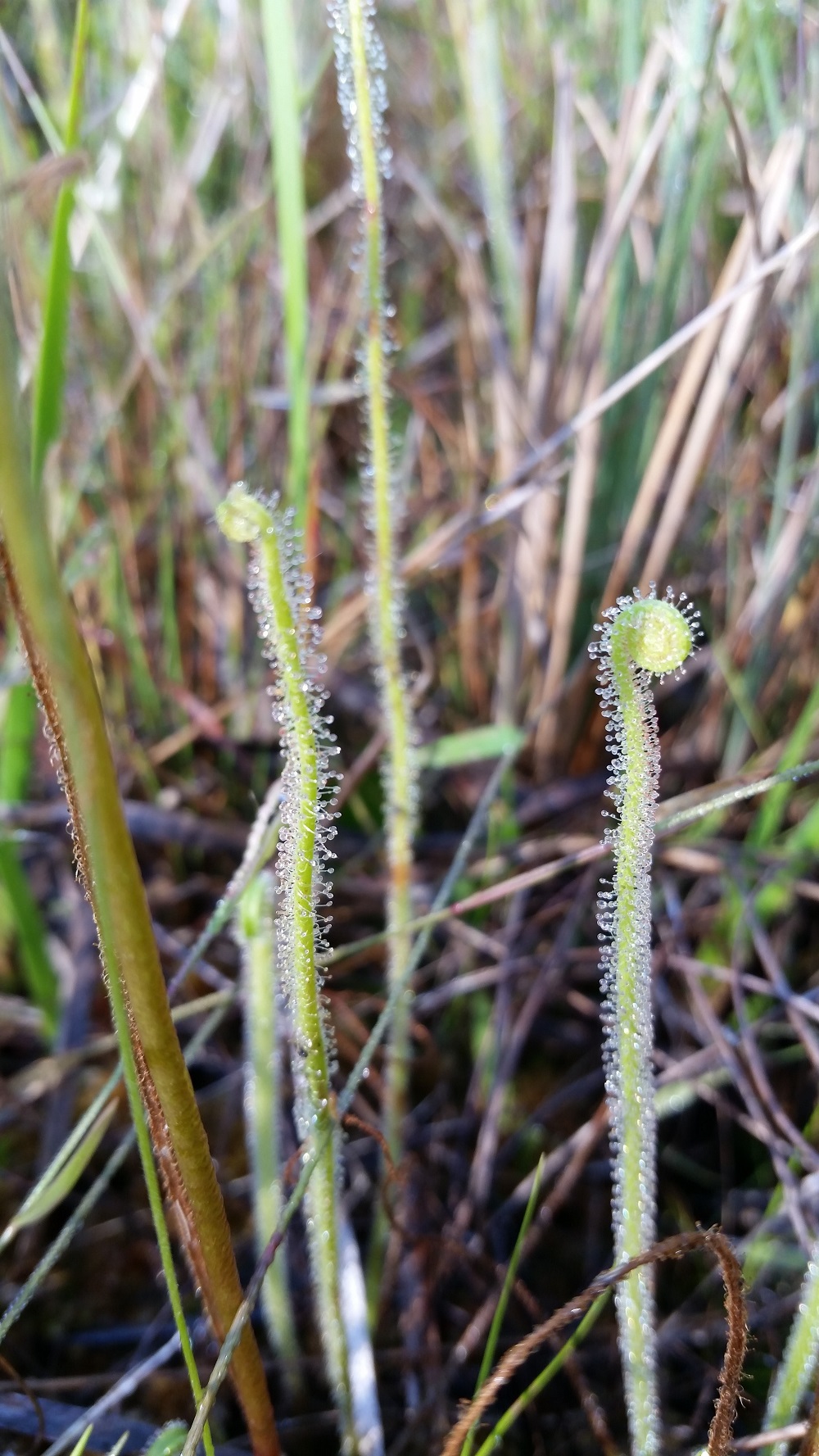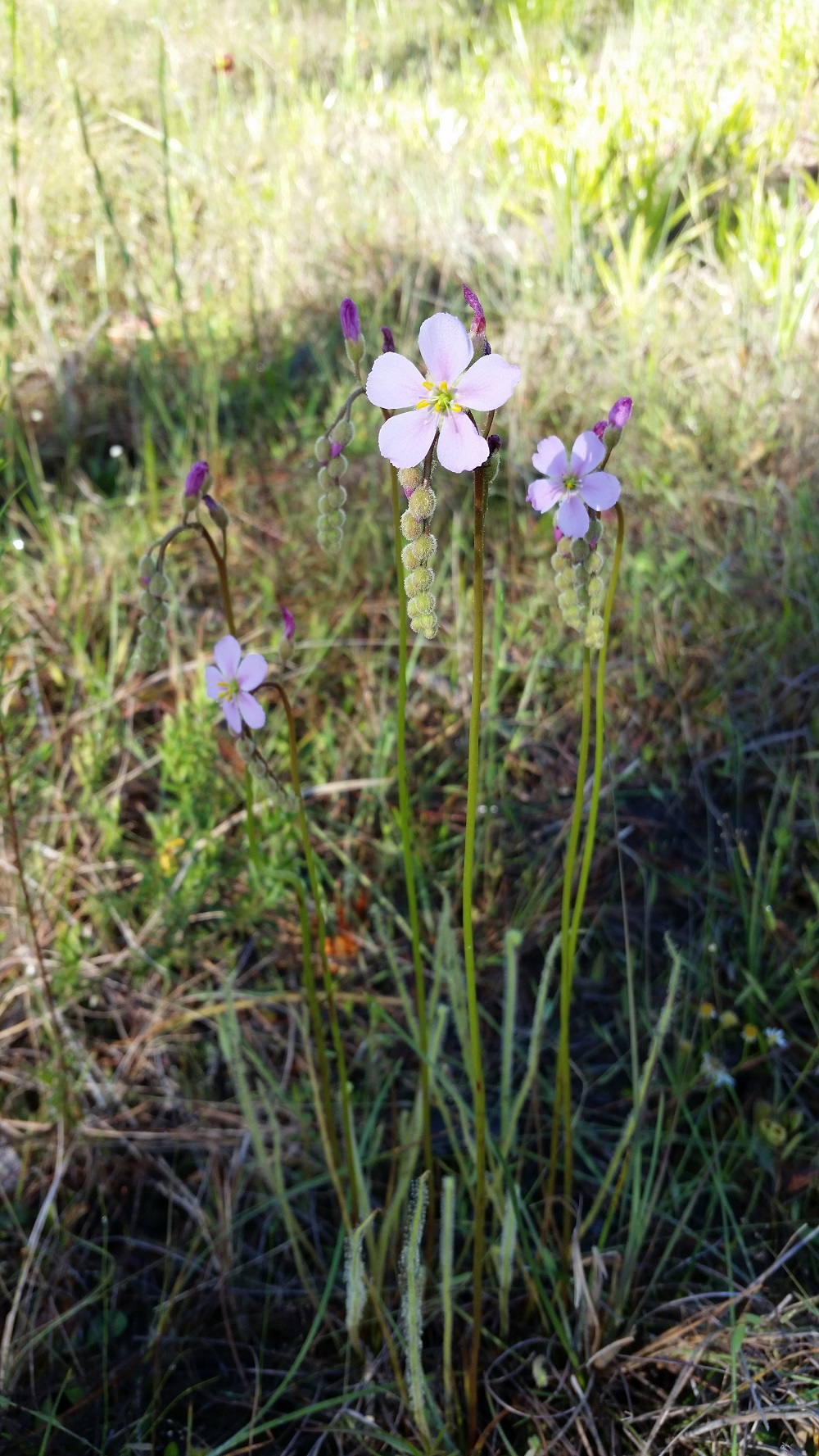Difference between revisions of "Drosera tracyi"
(→Conservation and Management) |
HaleighJoM (talk | contribs) (→Ecology) |
||
| (6 intermediate revisions by 5 users not shown) | |||
| Line 18: | Line 18: | ||
Common name: Tracy's sundew | Common name: Tracy's sundew | ||
==Taxonomic notes== | ==Taxonomic notes== | ||
| + | Synonyms: none.<ref name="weakley">Weakley, A.S. 2015. Flora of the southern and mid-atlantic states. Working Draft of 21 May 2015. University of North Carolina at Chapel Hill, Chapel Hill, North Carolina.</ref> | ||
| + | |||
| + | Varieties: none.<ref name="weakley">Weakley, A.S. 2015. Flora of the southern and mid-atlantic states. Working Draft of 21 May 2015. University of North Carolina at Chapel Hill, Chapel Hill, North Carolina.</ref> | ||
| + | |||
''Drosera tracyi'' is often considered a synonym of ''Drosera filiformis''. The Plant List recognizes ''Drosera tracyi'' as a synonym of ''Drosera filiformis'' var. ''tracyi''. | ''Drosera tracyi'' is often considered a synonym of ''Drosera filiformis''. The Plant List recognizes ''Drosera tracyi'' as a synonym of ''Drosera filiformis'' var. ''tracyi''. | ||
| + | |||
==Description== | ==Description== | ||
<!-- Basic life history facts such as annual/perrenial, monoecious/dioecious, root morphology, seed type, etc. --> | <!-- Basic life history facts such as annual/perrenial, monoecious/dioecious, root morphology, seed type, etc. --> | ||
''Drosera tracyi'' is a carnivorous plant. A description of this species is provided in [http://efloras.org/florataxon.aspx?flora_id=1&taxon_id=250101269 The Flora of North America]. | ''Drosera tracyi'' is a carnivorous plant. A description of this species is provided in [http://efloras.org/florataxon.aspx?flora_id=1&taxon_id=250101269 The Flora of North America]. | ||
| − | Generally, for the ''Drosera'' genus, they are an "annual or a perennial, rosulate, scapose herbs. Leaves with tentacle-like, glandular trichomes, the glistening, sticky secretion of each gland contributing to the insect-catching function of the leaf, and to the common name. Flowers perfect, actinomorphic, 5-merous; sepals and petals persistent, enclosing the capsule; stamens 5; ovary syncarpous, superior, 1-locular. Capsule valvate, seeds minute." | + | Generally, for the ''Drosera'' genus, they are an "annual or a perennial, rosulate, scapose herbs. Leaves with tentacle-like, glandular trichomes, the glistening, sticky secretion of each gland contributing to the insect-catching function of the leaf, and to the common name. Flowers perfect, actinomorphic, 5-merous; sepals and petals persistent, enclosing the capsule; stamens 5; ovary syncarpous, superior, 1-locular. Capsule valvate, seeds minute." <ref name="Radford 1964">Radford, Albert E., Harry E. Ahles, and C. Ritchie Bell. Manual of the Vascular Flora of the Carolinas. 1964, 1968. The University of North Carolina Press. 516-7. Print.</ref> |
==Distribution== | ==Distribution== | ||
| + | ''Drosera tracyi'' is endemic to the east Gulf Coastal Plain in a narrow belt from southwest Georgia to southeast Louisiana and northwest Florida.<ref>Sorrie, B. A. and A. S. Weakley 2001. Coastal Plain valcular plant endemics: Phytogeographic patterns. Castanea 66: 50-82.</ref> | ||
| + | |||
==Ecology== | ==Ecology== | ||
| − | ===Habitat=== <!--Natural communities, human disturbed habitats, topography, hydrology, soils, light, fire regime requirements for removal of competition, etc.--> | + | <!--===Habitat===--> <!--Natural communities, human disturbed habitats, topography, hydrology, soils, light, fire regime requirements for removal of competition, etc.--> |
| − | |||
===Phenology=== <!--Timing off flowering, fruiting, seed dispersal, and environmental triggers. Cite PanFlora website if appropriate: http://www.gilnelson.com/PanFlora/ --> | ===Phenology=== <!--Timing off flowering, fruiting, seed dispersal, and environmental triggers. Cite PanFlora website if appropriate: http://www.gilnelson.com/PanFlora/ --> | ||
| − | + | It flowers March to July with peak inflorescence in April and May.<ref>Nelson, G. [http://www.gilnelson.com/ PanFlora]: Plant data for the eastern United States with emphasis on the Southeastern Coastal Plains, Florida, and the Florida Panhandle. www.gilnelson.com/PanFlora/ Accessed: 8 DEC 2016</ref> | |
| − | ===Seed dispersal=== | + | <!--===Seed dispersal===--> |
<!--===Seed bank and germination===--> | <!--===Seed bank and germination===--> | ||
| − | ===Fire ecology=== <!--Fire tolerance, fire dependence, adaptive fire responses--> | + | <!--===Fire ecology===--> <!--Fire tolerance, fire dependence, adaptive fire responses--> |
| − | <!--Pollination===--> | + | <!--===Pollination===--> |
| − | <!--=== | + | <!--===Herbivory and toxicology===--><!--Herbivory, granivory, insect hosting, etc.--> |
<!--===Diseases and parasites===--> | <!--===Diseases and parasites===--> | ||
| − | |||
| − | == | + | ==Conservation, cultivation, and restoration== |
| + | |||
| + | ==Cultural use== | ||
==Photo Gallery== | ==Photo Gallery== | ||
<gallery widths=100px> | <gallery widths=100px> | ||
| Line 48: | Line 55: | ||
==References and notes== | ==References and notes== | ||
| − | |||
Latest revision as of 20:07, 27 June 2022
Common name: Tracy's sundew
Contents
Taxonomic notes
Synonyms: none.[1]
Varieties: none.[1]
Drosera tracyi is often considered a synonym of Drosera filiformis. The Plant List recognizes Drosera tracyi as a synonym of Drosera filiformis var. tracyi.
Description
Drosera tracyi is a carnivorous plant. A description of this species is provided in The Flora of North America.
Generally, for the Drosera genus, they are an "annual or a perennial, rosulate, scapose herbs. Leaves with tentacle-like, glandular trichomes, the glistening, sticky secretion of each gland contributing to the insect-catching function of the leaf, and to the common name. Flowers perfect, actinomorphic, 5-merous; sepals and petals persistent, enclosing the capsule; stamens 5; ovary syncarpous, superior, 1-locular. Capsule valvate, seeds minute." [2]
Distribution
Drosera tracyi is endemic to the east Gulf Coastal Plain in a narrow belt from southwest Georgia to southeast Louisiana and northwest Florida.[3]
Ecology
Phenology
It flowers March to July with peak inflorescence in April and May.[4]
Conservation, cultivation, and restoration
Cultural use
Photo Gallery
References and notes
- ↑ 1.0 1.1 Weakley, A.S. 2015. Flora of the southern and mid-atlantic states. Working Draft of 21 May 2015. University of North Carolina at Chapel Hill, Chapel Hill, North Carolina.
- ↑ Radford, Albert E., Harry E. Ahles, and C. Ritchie Bell. Manual of the Vascular Flora of the Carolinas. 1964, 1968. The University of North Carolina Press. 516-7. Print.
- ↑ Sorrie, B. A. and A. S. Weakley 2001. Coastal Plain valcular plant endemics: Phytogeographic patterns. Castanea 66: 50-82.
- ↑ Nelson, G. PanFlora: Plant data for the eastern United States with emphasis on the Southeastern Coastal Plains, Florida, and the Florida Panhandle. www.gilnelson.com/PanFlora/ Accessed: 8 DEC 2016



